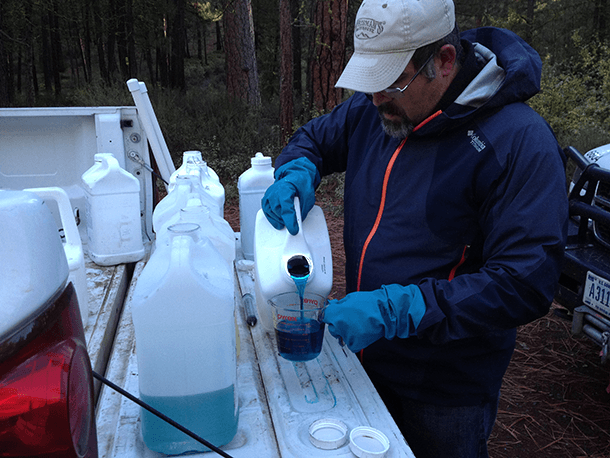Uprooting an Invasive Ribbon Grass on the Metolius River
CURWOOD: Now, from restoring a plant associated with water…to ripping one out! Youve probably seen ribbon grass. Its a pretty, leafy plant, and Better Homes and Gardens calls the variegated kind a perfect plant for adding a dose of color anywhere you don’t want to maintain; it’s a fast-spreading variety perfect for covering slopes. But perfect for covering slopes makes it something of an invasive nuisance in the Northwest, where its choking one of Oregons most pristine waterways. Courtney Flatt from the public media collaborative EarthFix has the story.
An island covered in ribbon grass. (Photo: Courtesy of Maret Pajutee)
FLATT: Looking at the banks of the Metolius River in central Oregon, nothing really seems wrong. But train your eye a little, and you start noticing large patches, even entire islands, covered in thin, green grass. Merit Pajutees a forest service ecologist.
PAJUTEE: Aldo Leopold said that living with an ecological consciousness is like living in a world of wounds.
FLATT: The wound on the Metolius River is ribbon grass. Its bunches of leaves have squeezed out native sedges and wildflowers. As the wildflowers disappeared, the number of pollinating insects dropped. Pajutee says rumor has it ribbon grass came to Oregon in the 50s, when someone planted the pretty grass in a flowerbed. Then, like most invasive plants, it kept growing.
The same island after treatment. Friends of the Metolius covered the island with a black tarp, hoping that less sunlight would kill the ribbon grass. They left the tarp on for three years. It killed the ribbon grass, but also killed other plants on the island. (Photo: Courtesy of Maret Pajutee)
PAJUTEE: And I think the reason it has done so well here is the character of the Metolius, and its spring-fed nature. It really found the perfect home, where it can spread.
FLATT: Ribbon grass is found throughout the Northwest. Its relatively contained, but here on the Metolius its growing like crazy.
The Metolius is a wild and scenic river. Its home to Oregons healthiest bull trout population and recovering salmon sockeye runs. One of the big concerns is that ribbon grass doesnt provide a lot of cover for fish to hide in the winter. Thats why this year the Oregon legislature listed ribbon grass as an official noxious weed.
One organization trying to get rid of the ribbon grass is the Friends of the Metolius. For years the conservation group tried several tactics. They tried throwing black tarps over the grass. That didnt work as well. Then they hand picked it. Pete Schay is with the Friends of the Metolius. He says handpicking the weeds was backbreaking labor.
SCHAY: Its very heavy. Its mostly water. Its 99 percent water that youre pulling – dragging around.
Crews filled a truck bed with ribbon grass they hand picked. (Photo: Courtesy of Maret Pajutee)
FLATT: Crews filled an entire pickup truck with weeds. They took the ribbon grass to a gravel pit and covered it with a tarp to kill it. A couple years later, the ribbon grass started growing back.
Now, theyre trying herbicides. Mike Crumrine is with the Oregon Department of Agriculture. He wades through the frigid waters.
CRUMRINE: Wiping the herbicide on with, in essence, a sponge. Rubbing the plant, every bit of the plant that you can get to thats above water level, is the target goal.
FLATT: Theres a small window every fall when Crumrine can apply the herbicide.
Mike Crumrine applies herbicide to yellow iris, another invasive plant on the Metolius River. (Photo: Courtesy of Maret Pajutee)
REPORTER: So do you think youll ever be able to knock it all out?
CRUMRINE: Eventually, yes, I have some great hope. Looking at what were looking at right here, right now, I would estimate were looking at a 90 percent reduction.
FLATT: Water quality tests have shown the herbicides havent hurt fish or other species in the river. And the herbicides are working. There are finally a few places where native plants have started to come back.
Im Courtney Flatt in Sisters, Oregon.
CURWOOD: Courtney reports for the public media collaborative Earthfix.
